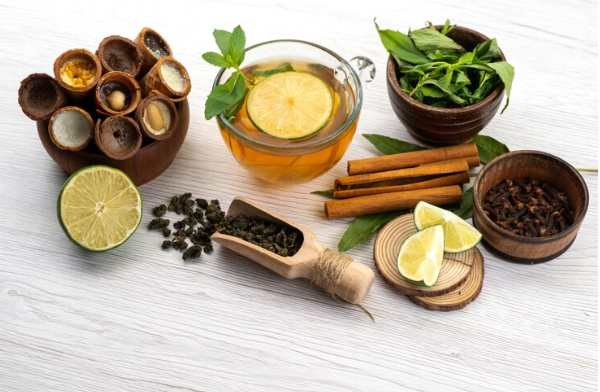
Managing diabetes effectively requires a holistic approach, often incorporating diet, exercise, and medication. In recent years, the use of “herbal diabetes capsules” has gained popularity as a complementary treatment option. These capsules contain natural ingredients known for their potential to help regulate blood sugar levels and improve overall health. Here, we explore the top 10 herbal ingredients commonly found in herbal diabetes capsules and their benefits.
Table of Contents
Toggle1. Bitter Melon (Momordica charantia)
Bitter melon, also known as bitter gourd, is a tropical fruit widely recognized for its blood sugar-lowering properties. It contains active compounds such as charantin, vicine, and polypeptide-p, which mimic insulin and help reduce blood glucose levels.
Benefits:
- Improves Insulin Sensitivity: Enhances the body’s ability to use insulin effectively.
- Lowers Blood Glucose: Reduces fasting and postprandial blood sugar levels.
- Antioxidant Properties: Protects cells from oxidative stress and damage.
2. Fenugreek (Trigonella foenum-graecum)
Fenugreek seeds are rich in soluble fiber, which slows down carbohydrate digestion and absorption, thereby helping to control blood sugar levels. The seeds also contain amino acids that stimulate insulin production.
Benefits:
- Reduces Blood Sugar Levels: Lowers both fasting blood sugar and HbA1c levels.
- Enhances Insulin Secretion: Stimulates the pancreas to produce more insulin.
- Improves Digestion: Supports overall digestive health, which is crucial for diabetes management.
3. Cinnamon (Cinnamomum verum)
Cinnamon is a popular spice with potent medicinal properties. It has been shown to improve insulin sensitivity and decrease blood sugar levels.
Benefits:
- Lowers Fasting Blood Sugar: Helps reduce blood sugar levels by improving insulin sensitivity.
- Anti-Inflammatory: Reduces inflammation, which is beneficial for preventing diabetes-related complications.
- Antioxidant Properties: Protects against oxidative damage and supports overall health.
4. Gymnema Sylvestre
Gymnema Sylvestre is an herb traditionally used in Ayurvedic medicine to treat diabetes. It is known for its ability to suppress sugar cravings and reduce blood sugar levels.
Benefits:
- Reduces Sugar Absorption: Blocks the absorption of sugar in the intestines.
- Enhances Insulin Production: Stimulates insulin secretion from the pancreas.
- Suppresses Sugar Cravings: Helps in controlling dietary sugar intake.
5. Berberine
Berberine is a bioactive compound found in several plants, including goldenseal, barberry, and Oregon grape. It has been extensively studied for its antidiabetic effects.
Benefits:
- Regulates Blood Sugar: Lowers blood glucose by improving insulin sensitivity and reducing glucose production in the liver.
- Anti-Inflammatory: Reduces inflammation and oxidative stress.
- Supports Gut Health: Promotes a healthy balance of gut bacteria, which is beneficial for metabolic health.
6. Turmeric (Curcuma longa)
Turmeric, particularly its active component curcumin, has powerful anti-inflammatory and antioxidant properties that can help manage diabetes.
Benefits:
- Improves Insulin Sensitivity: Enhances the body’s ability to use insulin effectively.
- Reduces Inflammation: Decreases inflammation associated with insulin resistance.
- Antioxidant Properties: Protects cells from oxidative damage.
7. Aloe Vera
Aloe vera is well-known for its healing properties, and it also offers benefits for diabetes management. It contains compounds like lectins, mannans, and anthraquinones that help lower blood sugar levels.
Benefits:
- Lowers Blood Glucose: Helps reduce fasting blood sugar and HbA1c levels.
- Improves Insulin Sensitivity: Enhances the effectiveness of insulin.
- Antioxidant and Anti-Inflammatory: Protects against oxidative stress and inflammation.
8. Ginseng (Panax ginseng)
Ginseng is a popular herb in traditional medicine, particularly in Asia. It is known for its ability to improve energy levels and mental performance, as well as its antidiabetic effects.
Benefits:
- Lowers Blood Sugar: Reduces fasting blood glucose and improves insulin sensitivity.
- Boosts Energy Levels: Enhances physical and mental performance, which is beneficial for overall health.
- Anti-Inflammatory: Reduces inflammation and oxidative stress.
9. Neem (Azadirachta indica)
Neem is a medicinal plant used in Ayurvedic medicine for its wide range of health benefits, including its ability to help manage diabetes.
Benefits:
- Lowers Blood Sugar Levels: Helps reduce fasting and postprandial blood glucose levels.
- Improves Insulin Sensitivity: Enhances the body’s response to insulin.
- Antibacterial and Antioxidant Properties: Supports overall health by protecting against infections and oxidative damage.
10. Holy Basil (Ocimum sanctum)
Holy basil, also known as tulsi, is revered in Ayurvedic medicine for its numerous health benefits. It has been shown to help manage blood sugar levels and improve insulin secretion.
Benefits:
- Reduces Blood Sugar: Lowers fasting and postprandial blood glucose levels.
- Enhances Insulin Secretion: Stimulates the pancreas to produce more insulin.
- Anti-Stress Properties: Reduces stress, which can be beneficial for managing diabetes-related complications.
Conclusion
Incorporating herbal diabetes capsules into your diabetes management plan can offer several benefits, from improved blood sugar control to enhanced overall health. Each of these herbs provides unique advantages, and when combined, they can work synergistically to help manage diabetes more effectively. However, it is crucial to consult with a healthcare professional before starting any new supplement, especially if you are currently taking other medications or have underlying health conditions.
Remember, while herbal supplements can be beneficial, they should complement a healthy lifestyle that includes a balanced diet, regular physical activity, and proper medical care.
Harry
